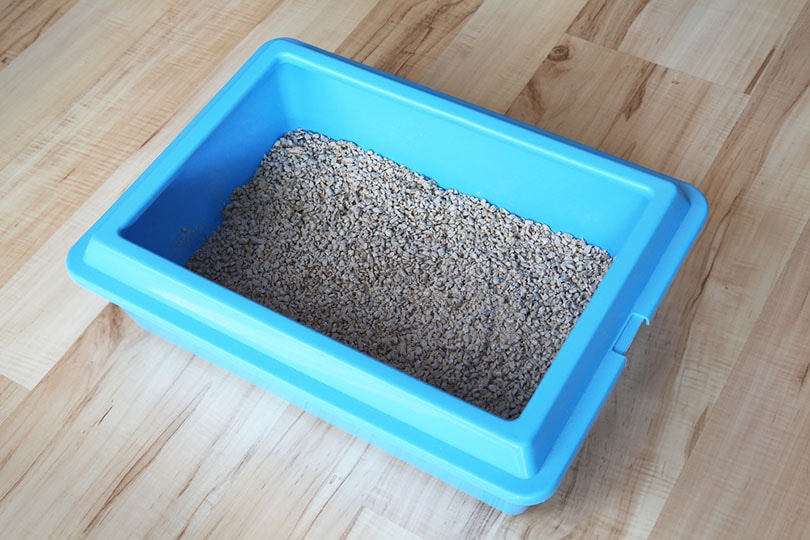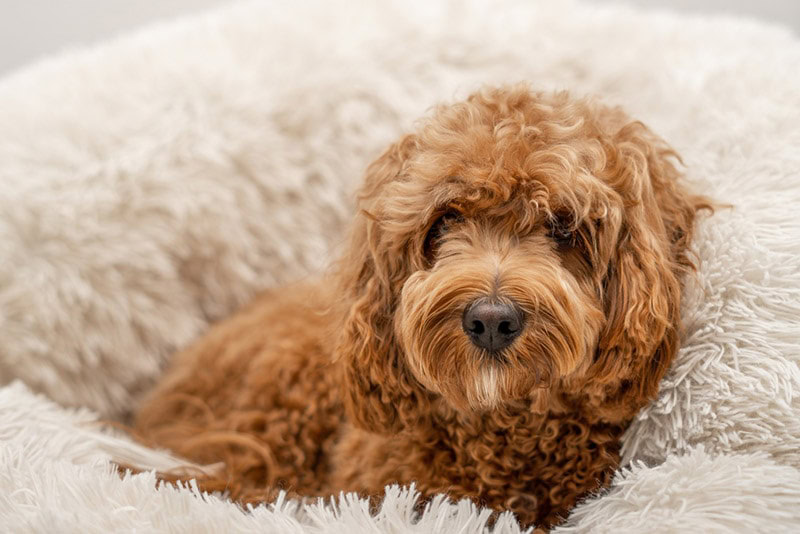VET APPROVED

The information is current and up-to-date in accordance with the latest veterinarian research.
Learn more »Click to Skip Ahead
Ferrets are uniquely amusing and irresistibly lovable furry companion pets, but not as popular as dogs or even cats. Their zany behavior and playful nature make them behaviorally similar to dogs, but they can be litter-trained like cats. That’s right—ferrets can be trained to use a litter box, but they do best with non-clumping litters, like recycled paper compressed into pellets.
Ferrets don’t always take to using their litter boxes as readily as cats, so be prepared to spend some time training them. It can be tricky, but it’s well worth the trouble to keep your ferret’s home environment clean and less smelly. To help you accomplish that goal, we’ve put together an educational article about the best types of litter to use and, of course, some valuable tips you can’t live without. Let’s get into the details below.

The 3 Best Types of Litter for Ferret Litter Boxes
Ferret litter boxes only superficially resemble cat litter boxes in the sense that they’re, well, boxes where your pet does their business. Regular clay litter is far too dusty to be suitable for your ferret’s litter box, and this dust tends to stick to a ferret’s nose when it’s sussing out where it wants to do its business. But there are plenty of good choices out there. We would recommend either pelleted paper products or grain pellets. You can also use wood-stove pellets made from hardwood but you need to be very careful when picking which type you use as some are not permitted for animal use due to added binders.
1. Wood Pellets
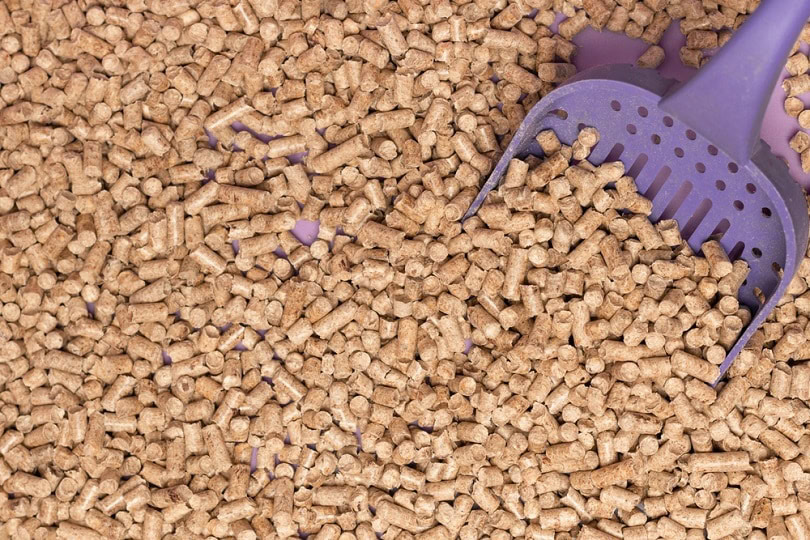
Compressed wood pellets made from sawdust are one of the top choices for ferret litter because they’re highly absorbent, crumble when wet for easy cleanup, and don’t produce any harmful dust. Even the most inquisitive ferrets sticking their nose in their litter box won’t suffer any harm from the endeavor, making wood pellets a safe choice, as long as some precautions are taken:
- Ensure the pellets are made of hardwood.
- Avoid cedar and pine pellets, or other softwoods that contain acids and phenols, which are harmful to ferrets.
- Avoid pellets not designed for animal use because pellets used in wood fuel stoves may contain oils or potentially harmful additives.
2. Paper Products
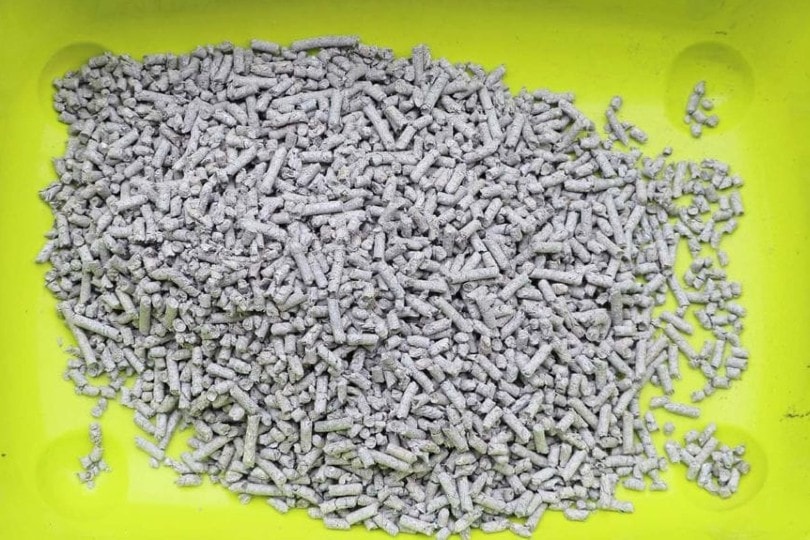
Paper pellets are simply made of compressed paper. They are excellent at absorbing moisture and therefore removing odor. Many brands are made from recycled newspaper, are low in dust and are reasonably priced, however, some paper pellets are expensive.
Some ferret owners opt for normal newspaper to line a litter tray, either just as it comes, or shredded. Newspaper is cheap, plentiful and moderately absorbent but it gets stinky quickly and needs to be frequently changed, possibly twice daily in order to keep odor at a minimum. It’s still a good choice if you have easy access to lots of paper and you don’t mind frequent litter changes. Recycled paper litter is popular in pet stores and typically cheap, plus it’s eco-friendly.
3. Grain Pellets
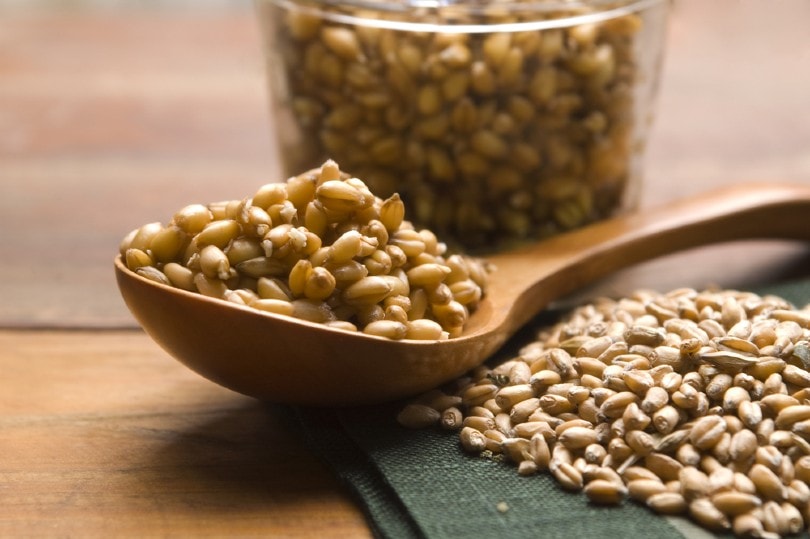
Litter pellets made from grains like corn husks and wheat are becoming popular because they reduce odor well, absorb a lot of moisture, and are biodegradable. Look for pellets advertised as dust-free, which use safe ingredients like cornstarch and baking soda to absorb moisture and minimize dust. Avoid formulas that contain silica or other clumping agents. On the downside, grain pellets leave a fine dust on your floor and may require additional cleanup.

Risks of Hazardous Litter: Which 3 Litters to Avoid
Now that you know what types of litter options you have available, it’s time to discuss which to stay away from. Ferrets aren’t as fastidious as cats and will gladly make a mess of traditional cat litter. They don’t bury their mess like cats do, so if they have deep litter, they will likely dig it out, making a big mess. There’s also the important matter of health hazards with certain types of wood pellet litter pose to ferrets. Scroll below for some info on the types of litter to avoid and why they’re bad for your ferret.
1. Clay Litter
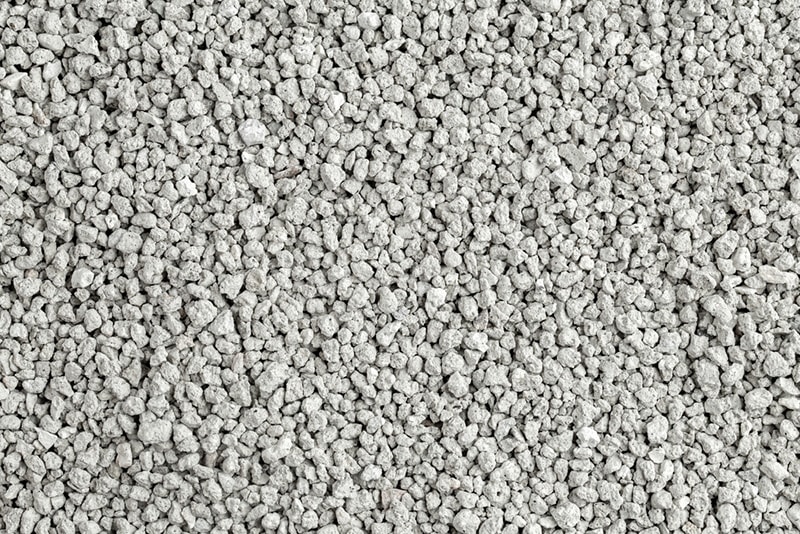
Clay litter may be commonly used for cat litter boxes, but it’s a terrible choice for a ferret litter box. Clay litter tends to clump up and get a sticky, muddy texture when wet, which can stick to your ferret. If a ferret with sticky clay litter scoots to clean their butt after using the litter box, the litter can enter into the rectum where it might expand, causing a blockage. The litter and dust can also get in their eyes, stomach, or respiratory system. Needless to say, clay litter isn’t good for your ferret.
2. Cedar and Pine Litter
The naturally occurring oils in cedar and pine wood make them poor choices for ferret litter. It’s good at absorbing moisture and masking odors but it contains chemicals that are toxic to ferrets. Avoid any products that use cedar or pine wood in any form, even shavings.
3. Silica Litter
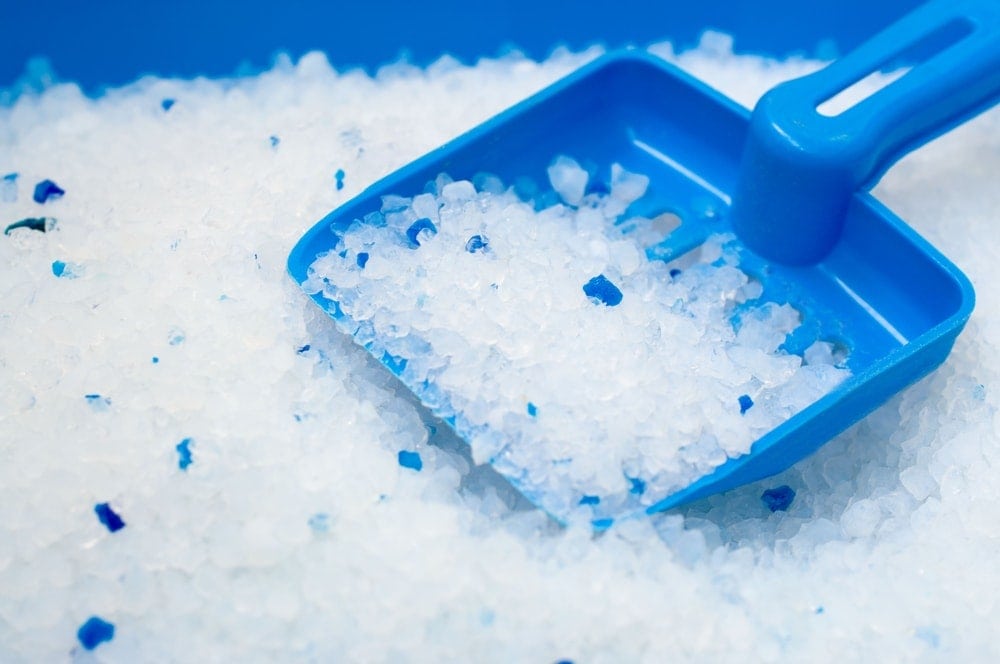
Silica-based cat litter can be hazardous for ferrets because some silica litter forms silica dust when wet and this can be breathed in, causing silicosis. Respiratory signs like wheezing and trouble breathing may occur with even brief exposure. Another type of silica-based cat litter is known as amorphous silica which does not produce silica dust and is safe for the respiratory tract, but it tracks heavily and many ferrets think they are dig boxes, not litter boxes. Simply put, silica litter can be toxic, and the non-toxic version isn’t ideal for ferrets, so steer clear!

Ferret Litter Training Tips
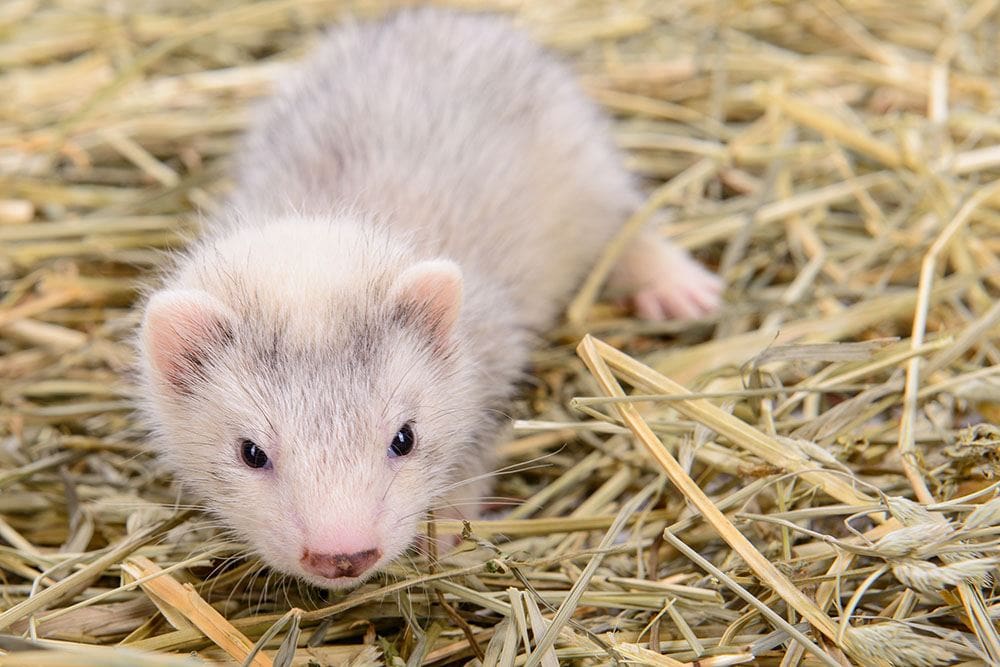
Litter training sticks best if you start from a young age, but it can be very challenging with older ferrets not used to the peculiar box in their cage. To help you navigate the process more easily, check out some valuable litter training tips just below.
- To start, place the litter box with your desired litter in the corner of your ferret’s cage. If they’ve already chosen a spot in their cage to do their business, place it there. You can also place litter trays in a few corners to see which your ferret prefers.
- To help them learn what the box is for, place some of their urine and feces in the box.
- Larger multi-level enclosures will need a litter box on each level, and there should be a litter box within easy access anywhere your ferret goes.
- Choose a litter box with a low edge because they may not use a box if the edges are too high. There are ferret boxes designed specifically for ferrets which are the best ones to go for.
- To minimize accidents during training, place your ferret in their cage with the litter box after every nap—this is when they usually go potty.
- Positively reinforce your ferret with treats when he/she does use the litter box successfully.
- If your ferret has an accident, first, stay calm, then promptly clean it with a pet-safe, enzymatic, odor-neutralizing cleaner and put them back in their cage.
If you're trying to find an enzyme cleaner that does it all, we highly recommend our favorite cleaner, the Hepper Advanced Bio-Enzyme Pet Stain & Odor Eliminator Spray.
| Rating | Image | Product | Details | |
|---|---|---|---|---|
 |
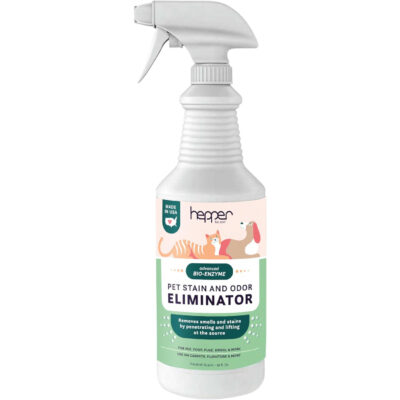 |
Hepper Advanced Bio-Enzyme Pet Stain & Odor Eliminator Spray |
|
CHECK PRICE |
It permanently removes the very worst stains and smells you can imagine and makes clean up a breeze. There's even a 100% satisfaction guarantee! Click here to order a bottle today.
At PangoVet, we’ve admired Hepper for many years, and decided to take a controlling ownership interest so that we could benefit from the outstanding products of this cool cat company!

Conclusion
Ferrets are generally fairly easy to litter train as long as you remain consistent, patient and give them time. Ensure you purchase a type of litter that’s safe and non-toxic, like wood, paper, or grain litter. Avoid silica, pine, cedar, and traditional cat litters that can pose serious health risks to your ferret. And above all, remember to be patient if your ferret isn’t naturally taking to the litter box. Sometimes they just need time to get used to it!
See also:
- Can Dogs Eat Dairy? Vet-Reviewed Nutritional Guide & FAQ
- Why Are My Cat’s Paws Peeling? 7 Vet-Reviewed Reasons
Featured Image Credit: Grzegorz Petrykowski, Shutterstock
